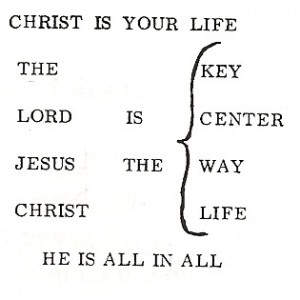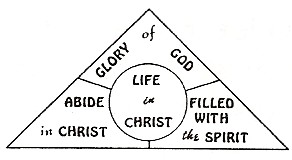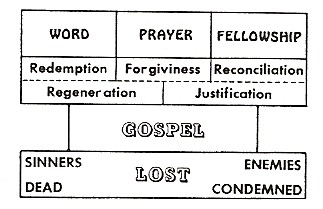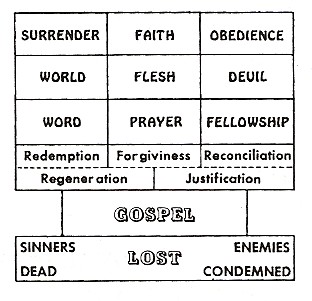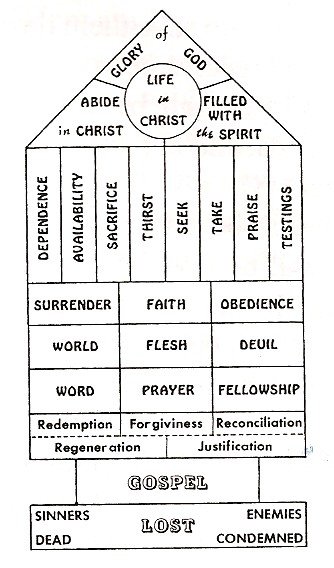Discipleship
CHRIST IS YOUR LIFE
By Homer Duncan
Missionary Crusader
2006
“For ye are dead, and your life is hidden with Christ in God. When Christ who is your life, shall appear, then shall you also appear with Him in glory” (Colossians 3:3,4). In these verses, the Spirit of God reveals that the Lord Jesus Christ is the life of the believer. Christ is the source of life; He has life; He gives everlasting life. When we have Christ, we have life (1 John 5:12). Nothing less than the very life of the risen Christ in us will enable us to live a life that is well-pleasing to God.
It is evident the average Christian comes far short of living the life described in the New Testament. Many earnest, sincere, and evidently born again Christians struggle through life without experiencing the power of God in their lives. They long for victory over sin but continue to live in its bondage. They want to be fruitful but, alas, are barren. They want to be good and to do good, but with the Apostle Paul they are compelled to cry, “How to perform that which is good I find not.”
If most Christians live defeated, up and down Christian lives, how can we expect the Church to do exploits for God? We sing, “Like a mighty army moves the Church of God,” but when we face the facts (read OPERATION WORLD, by Patrick Johnstone) we find the Church in many parts of the world is in a deplorable condition. Yes, thank God for the many exceptions to this last statement, but in many countries, less than 2 percent of the people are professing Christians. When we consider that spiritually-minded denominational leaders estimate that only 10 percent of the church members have been born again, we begin to understand what the Lord Jesus meant when he said, “When the Son of man comes, shall he find faith on the earth?” (Luke 18:8).
Even though the Bible teaches that this age is to end in apostasy, we must not give in to a blind fatalism and throw up our hands in despair. The Almighty God is still on His Throne! He still works all things after the counsel of His will. The Lord Jesus Christ is the same yesterday, today, and forever, and He has promised, “Lo, I am with you always, even unto the end of the age.” The Bible is filled with wonderful promises for the one who will dare to claim them. All of the unlimited resources of the Triune God are at our disposal, but we must learn how to use them. God has blessed us with every spiritual blessing in the heavenlies in Christ, but we must learn to possess our possessions. All that we need is found in the Lord Jesus, but we must learn to experience the life of the risen Christ.
To put it very simply, a Christian is one who has Christ (1 John 5:12), and the Christian lives the Christian life by letting Christ live through him (Gal. 2:20). We are saved by receiving the Lord Jesus Christ into our heart; we live the Christian life by walking in Him (Col. 2:6). When we were enemies, we were reconciled to God by the death of His Son. Now having been reconciled, we are saved by the life of the risen Christ (Rom. 5:10).
There are three tenses to our salvation: past, present, and future (2 Cor. 1:10). In the past, we were saved from the guilt and penalty of our sins when we exercised saving faith in the Lord Jesus Christ (Rom. 8:1). In the present tense, we are saved from the power of sin as we learn to live by faith (Rom. 6:14). In the future, we shall be saved from the very presence of sin at the second coming of Christ (1 Thess. 4:16,17). But, salvation is not only from sin; it is also unto sonship. In the past we were made a child of God at the very moment we received the Lord Jesus Christ (John 1:12). In the present tense we are to grow in grace (1 Pet. 3:18); we are to be perfecting holiness in the fear of the Lord (2 Cor. 7:1); we are to be conformed to the image of His Son (Rom. 8:29); we are to grow up unto the measure of the stature of the fullness of Christ (Eph. 4:13). In the future, when Christ comes the second time, we shall be made like Him for we shall see Him as He is (1 John 3:2).
In Romans 11:36 we read that we are of Him, through Him, and to Him. Here again, are the three tenses of our salvation. It is tragic that in so many so-called Christian circles God’s wonderful salvation is neither believed nor taught. In most orthodox Christian circles the past tense of salvation is preached from Sunday to Sunday. In fundamental circles, the past and the future tenses of salvation are emphasized. But, in too many areas the present tense of our salvation is overlooked. God’s great purpose in saving us is not only that our sins should be forgiven in order that we might escape the wrath of Hell, and then someday go to Heaven when we die, but it is His will that in this life we should know and experience the power of God in our lives. The new birth is not the end of salvation, but the beginning of it.
Every Christian knows that Christ is in his heart, but very few realize why He is there. Every Christian knows that Christ has all power in heaven and in earth, but very few experience the power of the risen Christ in their lives. Every Christian knows that Christ has forgiven his sins, but he does not know how to be delivered from the power of sin. Most Christians seek to live by imitation rather than by identification. They live by trying rather than trusting. They have been justified by faith, but they do not know how to live by faith. They have made their peace with God, but they do not experience the peace of God. They have everlasting life but do not have abundant life (John 10:10). They are indwelt by the Spirit (1 Cor. 6:19), but are not filled with the Spirit (Eph. 5:18).
THE AVERAGE CHRISTIAN LIFE
What about the average Christian? In many cases, he attends a modernistic church where he receives little or no spiritual food. If he is to grow in grace his spiritual nourishment must come from some other source. In other cases, he attends a Bible-believing church where the old-fashioned Gospel is preached, but this kind of preaching does not give the believer the spiritual food he needs.
If a Christian does not receive spiritual food, he becomes emaciated. If he is emaciated, he is weak. If he is weak, he cannot be strong in faith giving glory to God. Instead of having a vigorous faith, he settles down and begins to live as the other church members around him. By comparing himself with other church members, he feels that he is a very good Christian because he has turned away from several of the grosser sins. Perhaps he tithes and usually tries to go to church Sunday morning. Though he sings, “He taught me how to watch and pray and live rejoicing every day,” he knows little of such rejoicing in his daily experience. He sings about Beulah Land but does not live there. He sees sham and hypocrisy all about him, and after several years of trying to be faithful, he decides that he could be just as good a Christian by staying home on Sunday as he can by going to church.
GOD’S KIND OF CHRISTIANITY
All of this is in direct contrast to what the Bible teaches that the Christian life should be. The Bible describes the normal Christian life as being victorious (1 Cor. 15:57) and triumphant (2 Cor. 2:14). The Christian is to be more than a conqueror (Rom. 8:37). He is an Overcomer (Rev. 2:7). He is to be growing in grace (2 Pet. 3:18). He is to be perfecting holiness in the fear of the Lord (2 Cor. 7:1). He is to be steadfast, unmovable, always abounding in the work of the Lord (1 Cor. 15:58). He is to be fruitful in every good work and increasing in the knowledge of God (Col. 1:10). He is to bear much fruit to glorify God (John 15:8).
He is to love other Christians in the same measure that Christ loved him (John 13:34). He is to rejoice evermore; he is to pray without ceasing; and he is to give thanks in everything (1 Thess. 5:16-18).
He is to be like a tree planted by the rivers of water (Psalm 1:3). Jesus promised that rivers of living water shall flow from his life (John 7:37-39). He is to have a ministry of great works (John 14:12). He is to do exploits (Dan. 11:32) and is to reign in this life (Rom. 5:17).
Shall we throw up our hands in despair? For who can live such a life? It is not merely difficult to live a Christian life; it is sheer impossibility! I cannot live this life, and you cannot live it. Is God mocking us then with such high standards that we cannot possibly attain unto them? For many years I realized that it was utterly impossible to live the kind of life that is taught in the New Testament, but I thought that God was setting high standards before us so that we might earnestly strive and seek to do the best that we could to live such a life. But the secret is that we are not to live the Christian life in our own strength, but we are to live it by letting the omnipotent Christ live in and through us.
We are in Christ, and He is in us (John 14:20). When we abide in Him, and when He abides in us, we bear much fruit (John 15:5). We are in Christ (12 times in Ephesians One), and Christ is in us (Col. 1:27). We are complete in Him in Whom dwelleth all the fulness of the Godhead bodily (Col. 2:9,10). We are dead, and our life is hid with Christ in God (Col. 3:3); and for this reason Christ Himself is our life (Col. 3:4). Christ lives in us! He lives in us because our old nature was crucified with Him when He died on the Cross. We therefore live, but it is not really us, but Christ Who lives in us. For the life which we now live in the flesh is lived by the faith of the Son of God, who loved us and gave Himself for us and to us (Gal. 2:20). He is wonderfully able to live His life through us, as we yield ourselves to Him.
God has saved us that He might reveal His Son in us (Gal. 1:16). Our lives are to be a sweet savor to God, to other Christians, and to the lost (2 Cor. 2:15). We are to show forth the praises of Him who called us out of darkness into His marvelous light (1 Pet. 2:9). The beauty of the Lord our God is to be upon us (Psalm 90:17). The Lord Jesus Christ is to be magnified in our body (Phil. 1:20); and when this is true in our experience, we can say with Paul, “For me to live is Christ” (Phil. 1:21).
All that we have and all that we do is through Christ. We know that Christ is in our heart, but what does He want to do there? The answer is very simple. He wants to live there. He wants to express His life in your body and mine in the same way that He expressed His life in His human body when He walked on the shores of Galilee. Let us illustrate it this way:
ILLUSTRATED WITH A GLOVE
Often in my meetings, I carry an old glove with me. I place the glove on the pulpit beside a songbook, and then I ask the congregation, “Do you think that the glove can pick up the songbook?” Of course, they know that it cannot, but I tell them that it can. However, when I tell the glove to pick up the songbook, it does not do so. Then I tell the people, “This old glove is a picture of you and of me. We can no more live the Christian life than the glove can pick up the songbook.”
But the glove must pick up the songbook; so I try something else. This time I shout at the glove to pick up the songbook, but still there is no response. In the same way, the preacher may shout at the people every Sunday, but this does not enable them to live the Christian life. Then I pick up the glove and give it a good beating, but it still does not pick up the songbook. In the same way preachers “thrash” their congregation Sunday by Sunday, urging them to live for God and to get out and serve Christ, but such activity produces nothing but fleshly service.
Then I decide that I should tell the glove how to pick up a songbook. I explain to the glove that it should put its thumb on top and the fingers underneath the book, but even with this instruction, the glove is unable to pick up the book. In the same way, we may know perfectly how to live the Christian life, we may have read books by the score on the subject, we may understand all of the principles, but to our dismay, we fail again and again.
Then I decide that the glove needs a good cleaning; so I wash it with the best detergent. But even though the glove is perfectly clean, it is not able to pick up the songbook. In the same way, many of us have discovered that even though we have been to Jesus for His cleansing power, and even though our sins have been washed in the precious blood of Christ, we still lack the power to live the Christian life. For we are reconciled to God by the death of His Son, but we are saved by the life of the risen Christ (Rom. 5:10).
Can the glove pick up the book? Yes! I put my hand in the glove, and without any difficulty whatsoever it picks up the book. In the same way, when we learn to let Christ live in and through us we are able to live the life that God expects of us.
Before we leave the glove illustration, let us read another verse, “My little children, of whom I travail in birth again until Christ be formed in you” (Gal. 4:19). I pick up the glove and cram my fist into it. My hand is in the glove, but it is not formed in the glove. In the same way, many of us have Christ in our heart, but He is not allowed to control our life. As we yield ourselves to Him, he takes possession of the surrendered area. When my fist is crammed in the glove, and even though a finger is placed in the finger of the glove, it is still a rather grotesque sight until the entire hand is properly formed in every part of the glove. Our lives too are grotesque until He is formed in us. Oh, how we hinder Him and His purpose for our lives because we do not fully surrender every part of our being to Him.
ANOTHER ILLUSTRATION
Paul prayed thus for the saints at Ephesus, “that Christ may dwell in your heart by faith” (Eph. 3:17). Is not this a rather strange prayer since these folks were saints and already had the Lord Jesus Christ in their hearts? The keyword here is “dwell.” Christ wants to live there. He wants to control every part of our being.
Often I stay in various homes of Christian families as their guest. These people usually say, “Come right in, Brother Duncan, and make yourself at home.” But even though these good people may say this, I know what they mean, and I realize that I am in their home as a guest. Someone has well said, “If you make yourself at home, they will wish you were at home.”
When I am a guest, I act as a guest, I do not go browsing around through the attic or digging around in the cellar. I do not go into rooms reserved for the family, nor do I explore in the closets. I am in the house as a guest. When I am in my own home, I can go where I want to and do what I please. I have a complete right to every part of the house. However, we usually treat the Lord Jesus as the Heavenly Guest. We hear a sermon about hell, and we do not want to go there. We hear a sermon about meeting Mother in heaven; so we invite Jesus into our heart as Savior. He not only wants to be our Savior but since He is Lord, He wants to be the Lord of our life. It is only when we crown Him as Lord and honor Him as Lord that we experience His life.
THE LAST KEY
Dr. F. B. Meyer tells of this experience: “Sixteen years ago I was a minister in a Midland town in England, not at all happy, doing my work for the pay I got, but holding a good position amongst my fellows. Hudson Taylor and two young students came into my life. I watched them. They had something I had not. Those young men stood there in all their strength and joy. I said to Charles Studd, “What is the difference between you and me? You seem so happy, and I somehow am in the trough of the wave.”
He replied, “There is nothing that I have got which you may not have, Mr. Meyer.”
But I asked, “How am I to get it?”
“Well,” he said, “have you given yourself right up to God?”
I winced. I knew that if it came to that, there was a point where I had been fighting my deepest convictions for months. I had lived away from it, but when I came to the Lord’s table and handed out the bread and wine, then it met me, or when I came to a convention or meeting of holy people, something stopped me as I remembered this. It was the one point where my will was entrenched. I thought I would do something with Christ that night which would settle it one way or the other, and I met Christ. You will forgive a man who owes everything to one night in his life if to help other men he opens his heart for a moment. I knelt in my room and gave Christ the ring of my will with the keys on it, but kept one little key back, the key of a closet in my heart, in one back story in my heart. He said to me:
“Are they all here?”
And I said, “All but one.”
“What is that?” said He.
“It is the key of a little cupboard,” said I, “in which I have got something which Thou needest not interfere with, but it is mine.”
Then, as He put the keys back into my hand, and seemed to be gliding away to the door, He said:
“My child, if you cannot trust Me with all, you do not trust me at all.”
I cried, “Stop,” and He seemed to come back; and holding the little key in my hand, in thought I said:
“I cannot give it, but if Thou wilt take it Thou shalt have it.”
He took it, and within a month from that time He had cleared out that little cupboard of things which had been there for months. I knew He would.
May I add one word more? Three years ago I met the thing I gave up that night, and as I met it I could not imagine myself being such a fool as nearly to have sold my birthright for that mess of pottage.
I looked up into the face of Christ, and said, “Now I am thine.” It seemed as if that was the beginning of a new ministry. The Lord got me on His wheel again and He made me again and He has been making me again ever since. I learned that night to say “yes,” and I have tried to say “yes” ever since.
THE SPIRIT-FILLED LIFE
All of this is made real in our experience by the Holy Spirit. God commands every believer to be filled with the Spirit. To be filled with the Spirit means to be controlled by the Spirit. There are four realities that reflect one who is filled with the Spirit. The first is thirst (John 7:37). If we are to be filled, we must sincerely desire to be filled. David, though guilty of two of the greatest sins a man can commit, was a man after God’s own heart. Why? It was because David had a heart that thirsted for God. He cried, “As the hart panteth after the water brooks, so panteth my soul after thee, O God” (Psalm 42:1). Many Christians do not thirst after God, because they have spoiled their spiritual appetites by feeding on the things of the world.
The second reality of being filled with the Spirit is full surrender. After the Apostle Paul has taken eleven chapters in the book of Romans to tell us of the riches we have in Christ, He tells us that it is our reasonable service to present our bodies as a living sacrifice to God. Though in a crisis experience we have made this surrender “once for all,” yet day by day and moment by moment we must continually yield ourselves to Him. We are not to yield the members of our body to sin, but we are to yield them to God (Rom. 6:13). So to speak, we take a blank piece of paper, sign our name at the bottom, and tell God to fill in whatever He will.
THE PARABLE OF THE BAMBOO
In many Oriental countries bamboo trees, with their hearts cut out of them, are used for water pipes. As we stand beside a beautiful bamboo tree, the owner of the tree comes and speaks to it in this way: “My tree, I can use thee, if thou art willing to give up thy self to me.” The tree answers, “Of course, my master, I am glad to give my self to thee. I am glad to stretch my beautiful branches toward the heaven and drink in thy sunshine and rain. I am glad in this way to show forth thy beauty and thy praise.” But the master says, “My tree if I would use thee, I must cut thee down. I will lop off all of thy branches. I will cut out your heart. I will carry thee far away to some hidden spring so that my living water may flow through thee. Art thou willing to thus give thy self to me?”
In the same way, when God speaks to us, we readily respond offering ourselves to Him for Christian service. All of us would be glad to be a great evangelist, a talented musician, or a successful soul-winner. But God says, “I must cut you down. I must lop off all of your natural attainments. I must break your heart.” If God is to use us, He must mold and make us after His will. Before He can make us, He must break us. What we give, God takes; what He takes, He breaks; what He breaks, He makes and uses for His own honor and glory. There is a battle and struggle in such surrender. As James H. McConkey was fighting this battle, God said to him, “If you cannot trust the Man who died for you, who can you trust?” As we come to realize that God’s will is good, perfect, and acceptable, we welcome it. Full surrender is not an insipid “being willing,” but it is a holy determination to do the will of God at all costs.
The third reality of being filled with the Spirit of God is that our lives must be free from known sin. Several years ago, while living in the second story of a house that was on a hill, we discovered that the water just barely ran out of the faucets. I thought that we did not have much water pressure because we were so high up. One day I mentioned this problem to our landlord, and he assured me that something must be wrong because they had plenty of pressure in their apartment downstairs. When the plumber checked our water pipes, he found them so full of rust and corrosion that the water could barely get through. Many of our lives are like this. They are so filled with sin and worldliness that the living water cannot get through. Instead of having rivers of living water flowing through us, we are like an old leaky faucet that drips all of the time.
Several years ago the water stopped running in the homes of a Vermont village. The people exclaimed, “It is too bad the reservoir has gone dry.” When men went to investigate the trouble, they found that the reservoir was full. When they checked the intake pipe, they found a dead muskrat in it stopping the flow of water. All known and unconfessed sin must be put from our lives before the rivers of living water can flow through us.
The fourth reality of being filled with the Holy Spirit is faith. We must receive the filling by a definite act of faith (John 7:38; Gal. 3:2) in the same way that we by faith received the Lord Jesus Christ as our personal Savior. Is it not strange that we will urge sinners to accept Christ by faith apart from feeling when we ourselves refuse to believe God for the fullness of the Spirit apart from some unusual manifestation? I am not speaking here of a cold intellectual faith, but of one that has been preceded by meeting the first three conditions.
HOW TO STAY FILLED WITH THE SPIRIT
It is one thing to be filled with the Spirit; it is another thing to stay filled. Charles G. Finney, a man who was mightily filled with the Holy Spirit, testified that if he lost the spirit of prayer, he lost the power of God. If we are to stay filled with the Spirit, we must not sin against the Spirit (seven specific sins against the Spirit are listed in the Bible). If we are to stay filled with the Spirit, we must learn to walk in the Spirit. What does it mean to walk in the Spirit? In the first place walking in the Spirit is exactly the opposite of walking in the flesh (Gal. 5:19-21). When we are walking in the Spirit, we constantly recognize the Spirit’s presence in our heart; we are continually dependent on Him; we are always led by Him.
THE LIFE HIDDEN WITH CHRIST IN GOD
Let us illustrate what we have said thus far in this way:
In the triangle, we have the Father, the Son, and the Holy Spirit. At the apex is the Glory of God. All that the believer is and is to do is for the glory of God. Nothing can be higher or greater than this. The two bottom angles of the triangle are “abide in Christ” and “filled with the Spirit.” In the center of these three is the life hidden with Christ in God. The believer is in the Father (1 Thess. 2:1), and the Father is in him (Eph. 4:6). The believer is in the Son (Eph. 1:1), and the Son is in him (Col. 1:27). The believer is in the Spirit (Rom. 8:9), and the Spirit is in him (1 Cor. 6:19). In the center of the triangle the word “Life” represents the fullness of life that comes from abiding in Christ and from being filled with the Spirit. This circle represents the normal Christian life that we are describing in this booklet.
BACK TO THE BEGINNING
Though all of the resources of Christ are ours at the very moment of salvation, we must take them before they are ours experientially. In order that we might trace the means that God uses to bring us into the fulness of Christ, let us go back to the beginning where God found us.
We came into this world having physical life, but being destitute of spiritual life. We were dead in trespasses and sin (Eph. 2:1), and were therefore by nature the children of wrath (Eph. 2:3. Even our own righteousness, the very best that we could do, was as filthy rags in God’s sight (Isa. 64:6). We were without God, without Christ, and without hope in the world (Eph. 2:12). We were enemies of God (Rom. 5:10), and were aliens from the commonwealth of Israel (Eph. 2:12). The condition of the unregenerate man can be summed up in one word: LOST (Luke 19:10).
THE GOSPEL OF THE GRACE OF GOD
If we are to get to know God and if we are to be what God wants us to be, we must be saved. We are saved by the Gospel of Christ (1 Cor. 15:1-3). The word “Gospel” means good news. The “good news” is that while you and I were lost, ruined, and condemned because of our sins, the Lord Jesus Christ came into the world and died on the Cross for our sins (1 Cor.15: 3). He not only died for our sins, but He bares our sins in His own body on the tree (1 Pet. 2:24). He, the Just One, suffered for us, the unjust, that He might bring us to God (1 Pet. 3:18). As He hung on the Cross, He cried, “It is finished.” That means PAID IN FULL.
Suppose I owe a debt at the bank which I am unable to pay. If a wealthy friend of mine pays the note for me, I am just as free of the obligation as if I had paid it myself. You and I had a sin debt which we could never pay. We could not pay with our good works, because a dead man can only produce dead works (Hebrews 9:14). But God loved us (John 3:16; Romans 5:8) and gave His Son to die in our place and stead. He was buried that He by the grace of God should taste of death for every man (Hebrews 2:9). When His body was placed in the newly made tomb of Joseph of Arimathea, He could not be held by death, and He was raised again on the third day (1 Cor. 15:4). He was delivered for our offenses but was raised again for our justification (Romans 4:25).
Before we can be saved, we must recognize that we are lost sinners and that we need a Savior. We must believe that Christ died on the cross for our sins and that He was raised again on the third day. When we by faith receive this living Christ into our heart, we are made a child of God (John 1:12).
BASIC ELEMENTS OF SALVATION
When God saves us, He blesses us with every spiritual blessing in the heavenlies in Christ (Eph. 1:3), but these blessings are not ours experientially until we appropriate them. A study of the New Testament will reveal that at least seventy-two things are done for the sinner the moment he believes on Christ. Five of the most important things are regeneration, justification, forgiveness, redemption, and reconciliation. Let us illustrate our thinking this way:
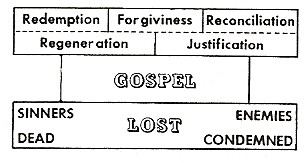 Many Christians go no further than this. If they are regenerated, forgiven, justified, redeemed and reconciled, they are saved and will go to heaven when they die, but the Bible says they will be saved so as by fire. It is not the will of God for us to stop here but for us to go on to maturity. We start out as babies, but we should develop into men (1 John 2:12-14). We are to go on with God (Hebrews 6:11); we are to grow in grace (2 Pet. 3:18); we are to grow up unto the measure of the stature of the fulness of Christ (Eph. 4:13).
Many Christians go no further than this. If they are regenerated, forgiven, justified, redeemed and reconciled, they are saved and will go to heaven when they die, but the Bible says they will be saved so as by fire. It is not the will of God for us to stop here but for us to go on to maturity. We start out as babies, but we should develop into men (1 John 2:12-14). We are to go on with God (Hebrews 6:11); we are to grow in grace (2 Pet. 3:18); we are to grow up unto the measure of the stature of the fulness of Christ (Eph. 4:13).
THE BIBLE IS A BASIC MEANS OF GRACE
If we are to go on with God, if we are to grow in grace, we must use the means that God has provided for our growth and development. Since the Bible is our food, there can be no growth apart from it. “How firm a foundation, ye saints of the Lord, is laid for your faith in His excellent Word.”
We are to believe the Bible, and we are to obey it. We are to take it in; we are to give it out. There are five basic ways through which we can take the Bible into our own hearts:
- By hearing it.
- By reading it.
- By studying it.
- By memorizing it.
- By meditating on it.
No matter what our spiritual attainments may be, we shall never get to the place where we will not need to daily feed on the Word of God. If we would be like a tree planted by the rivers of water, we must learn to meditate on God’s Word day and night (Psalm 1:2,3).
THE IMPORTANCE OF PRAYER
The second means of growth in grace is prayer. Prayer is the breath of the soul. A good definition of prayer is “talking with God” (Num. 7:89). Just as we breathe without ceasing, we are to pray without ceasing (1 Thes. 5:17).
“What a friend we have in Jesus,
All our sins and griefs to bear!
What a privilege to carry
Everything to God in prayer.”
A talented pianist learns how to play the piano through practice, and we learn to pray by praying. It takes time; it takes effort to pray, but “the effectual fervent prayer of a righteous man availeth much” (James 5:16). When we pray, we get what God can do. “Lord, teach us to pray.”
FELLOWSHIP WITH GOD
The third means of grace that God has provided so that we can go on with Him is confession. When we sin, we do not lose our salvation, but we lose the joy of salvation. When we sin, we do not lose the Holy Spirit, but we lose the power of the Spirit. God has made provision so that the sinning saint can be restored to His fellowship by confessing his sin (1 John 1:9). We are not to confess our sins to a priest or to any other man but to God who alone can forgive sins.
Our need for continual cleansing is illustrated for us in the washing of the disciples’ feet. In the days of our Lord ordinary people did not have a private bath in their own home; so they went to a public bath where they bathed in water heated with stones. As they returned to their homes from the public bath, their feet became defiled and soiled with dust and refuse of the street. It was customary then, as it is now in many oriental countries, to leave one’s shoes at the door. At the home of the thoughtful host, the guest would be met by a servant who would wash his feet.
When Jesus and the disciples gathered in the Upper Room for the Last Supper, no servant was there to wash their feet. Each of the disciples was too proud to humble himself and wash the others’ feet; so Jesus took a towel and girded himself and began to wash their feet.
The lesson we need to learn is this. After we have been wonderfully saved by the grace of God, and after we have had our sins washed in the precious blood of Jesus, we still get defiled with sin as we walk through this sinful world. It is not necessary for us to get saved over and over again each time we sin. What kind of salvation would this be? But, if we do sin, we must be restored to fellowship with God by confessing our sins to Him.
We must have the proper balance in our thinking here. On the one hand, we must not live in such a way that we are continually confessing our sins to God. We are to learn how to have victory over our sins through Christ. On the other hand, it must be perfectly clear in our thinking that we can never go beyond this basic provision that God has made for us. If we do sin, we are able to confess and experience continued forgiveness and fellowship with God.
The following chart illustrates our progress to this point.
THREE GREAT ENEMIES
The world, the flesh, and the devil are three great enemies of the Christian. We must recognize them as enemies; we must know their tactics. We must overcome these enemies in our walk with God, and if we are to be what God wants us to be.
THE WORLD IS OUR ENEMY
Since the world is an enemy of the Christian, we must know what the Bible teaches about the world and our relationship to it. Jesus said, “If ye were of the world, the world would love his own: but because ye are not of the world but I have chosen you out of the world, therefore the world hateth you” (John 15:19). The Christian is not to be conformed to the world but is to be transformed by the renewing of his mind (Romans 12:2). One of two things is happening in the life of every believer; either he is being conformed to the world, or he is being transformed into the image of Christ. The Christian is not to be unequally yoked together with unbelievers; he is to have no fellowship with the unfruitful works of darkness; he is to be separated from the things of the world (2 Cor. 6:11-17; Eph. 5:11).
When we play with the world, we are guilty of spiritual adultery (James 4:3,4). The Apostle John said, “Love not the world, neither the things that are in the world. If any man loves the world, the love of the Father is not in him. For all that is in the world, the lust of the flesh, and the lust of the eyes, and the pride of life is not of the Father but is of the world. And the world passeth away, and the lust thereof, but he that doeth the will of God abideth for ever” (1 John 2:15-17). John pictures the world as a baby lulled to sleep in Satan’s arms (1 John 5:19). If we compromise with the world, if we play with the things of the world, we will never know the power of God in our lives. Someone once said to D. L. Moody, “I would give the world if I had your power.” Mr. Moody quietly replied, “That is exactly what it cost me.”
SATAN IS OUR ENEMY
Since God is holy and since Satan is a monster of iniquity, a gigantic conflict rages between them for the soul of every man. It is the purpose of God to save men and to conform them to the image of His Son. It is the purpose of Satan to keep men in the bondage of sin so that he may damn their souls to hell.
Puny man is something like a basketball in a heated game between skillful players. Both teams are constantly fighting with all of their strength for the control of the ball. God and Satan are engaged in constant conflict over every individual in the world, both of the saved and of the lost. There is a difference, of course, between man and a basketball; man has a will of his own and can choose who he will believe and obey.
The great masses of people in the world are under Satan’s dominion. They are sold under sin; they are slaves to sin; they are dead in trespasses and sins. Satan binds them through fear and superstition. He entraps them in one of his many religions which may be pagan or pseudo-Christian.
It is hard to get the unconverted saved because Satan does not easily relinquish his captives. When the sinner is converted to Christ, the conflict is not over but is intensified. When a person is saved, Satan seeks to keep him from growing in grace. This explains why most of the members of God’s family are still babies. When a Christian does begin to go on with God, the conflict becomes more fierce. When any Christian begins to be greatly used of God, all of the hosts of hell are arrayed against him. Satan destroys the usefulness of the average Christian by keeping him in bondage to the things of the world. When the Christian begins to live a separated life, Satan attacks him through the flesh (that territory within a man’s soul that was yielded to Satan when Adam fell in sin). When the believer begins to get victory over the world and over the flesh, Satan attacks in all of his fury.
THE DEVIL’S DEVICES
One of the devil’s devices is to make people believe that he does not really exist. He is delighted when preachers say, “There is no devil.” If people believe there is a devil, he wants them to think of him as a slimy, loathsome, two-horned monster. In reality, Satan is transformed into an angel of light (2 Cor. 11:14).
He always makes his first attack on the Word of God (Gen. 3:1). If he can make us doubt the integrity of God and the integrity of God’s Word, he knows that we have no ground to stand on (Psalm 11:3).
Another of his weapons is discouragement. He knows that we are of no use to God when we are discouraged. Satan’s fall was caused by his pride, and he delights in getting us puffed up with spiritual pride because of our knowledge of the Word or because of our prayer life or because of our ability to preach.
He is a master at knocking us off-balance. When we learn some precious truth from the Word, he will seek to push us to fanatical extremes. When we begin to experience the power of the Holy Spirit in our lives, he will make us think we do not need the Bible anymore. When we learn the truth of the Living Word, he will cause us to minimize the importance of the written Word.
Does this mean that Satan is so powerful that we must ever remain under his control? NO! A thousand times, No! “Greater is He that is in you than he that is in the world” (1 John 4:4). The very theme and purpose of this booklet is to teach the believer how to experience victory through Christ, though be assured that Satan will subtly oppose every inch of your progress. If we are to defeat him, we must know his nature, and we must understand his devices. It is imperative that we learn to put on the whole armor of God if we are to stand against his strategies (Eph. 6:10-18). Remember that he is a coward! Resist the devil, and he will flee from you (James 4:7), but be sure to resist him in Jesus’ name and in Jesus’ strength.
SELF IS OUR ENEMY
The third great enemy of the believer is called by several names: the old man, the old nature, the flesh or self. Notice that if you drop the “h” from flesh and spell it backward you get self. They are one and the same. The big “I” is our problem. In the heart of every Christian, there is a cross and there is a throne. When self is on the throne, Jesus is on the cross; and when Jesus is on the throne, self is on the cross.
ALL THROUGH CHRIST
The world might be saved (John 3:17)
We are saved by grace (Acts 15:11)
We have peace with God (Rom. 5:1)
We are saved from wrath (Rom. 5:9)
We joy in God (Rom. 5:11)
We are alive unto God (Rom. 6:11)
The gift of God is eternal life (Rom. 6:23)
We are delivered from the body of death (Rom. 7:24,25)
We are more than conquerors (Rom. 8:37)
We glory in those things which pertain to God (Rom. 15:17)
God gives us the victory (1 Cor. 15:57)
The blessings of Abraham came on Gentiles (Gal. 3:14)
We have redemption (Eph. 1:7)
God will show the exceeding riches of His grace (Eph. 2:7)
We have access to the Father (Eph. 2:18)
We have the righteousness of God (Phil. 3:9)
The peace of God keeps our hearts and minds (Phil. 4:7)
The Holy Ghost is shed on us (Titus 3:5,6)
We have boldness to enter into the holiest (Heb. 10:19)
We are made perfect in every good work (Heb. 13:21)
God is glorified in all things (1 Peter 4:11)
We are to live (1 John 4:9)
Lord Jesus Christ died on the Cross, not only to redeem us from our sins but that He might reign as Lord on the throne of our heart. It is only when we honor Him as Lord that we experience His life.
Before we were saved, we had only one nature. Now that we are saved, we still have the same old nature, but through the new birth, we have received a new divine nature (2 Peter 1:4). These two natures are in constant conflict. “For the flesh lusteth against the Spirit, and the Spirit against the flesh: and these are contrary the one to the other: so that ye cannot do the things that ye would” (Gal. 5:17). In the seventh chapter of Romans, the Apostle Paul describes the conflict between the old and new natures. The new nature wants to do good, but the old nature refuses to do it. The new nature hates the evil deeds and bad habits of the old nature but is powerless to overcome them. The new nature wants to do right but lacks strength. Paul discovered nothing good in his old nature. The constant conflict between the two natures compelled him to cry, “O wretched man that I am! who shall deliver me from the body of this death?” (Romans 7:24).
TRAITS AND CHARACTERISTICS OF THE FLESH
If we are to overcome the flesh, we must understand its nature. When used in a theological sense “flesh” does not mean the meat that is on our bones, for that kind of flesh is not evil. If the flesh of our bodies were evil, the larger we were, the worse we would be. When used in a theological sense, flesh refers to that territory within man’s soul that was surrendered to Satan when Adam fell in sin. The flesh is all that we are by nature. It is that area of our lives through which Satan attacks us.
The flesh is always evil. It is carnal, corrupt, defiled, unclean and weak. The Bible speaks of the desires of the flesh, the lust of the flesh, the sins of flesh and the works of the flesh. “Now the works of the flesh are manifest, which are these; adultery, fornication, uncleanness, lasciviousness, idolatry, witchcraft, hatred, variance, emulations, wrath, strife, seditions, heresies, envyings, murders, drunkenness, revellings, and such like” (Gal. 5:19-20).
Since there is no good thing in the flesh (Romans 7:18), and since the flesh profits nothing (John 6:63), we are not to walk after it (Romans 8:4), nor are we to put any confidence in it (Phil. 3:3,4).
These evil aspects of the flesh are recognized by most Christians. However, all too often the subtle aspects of the flesh are overlooked. Since Satan is subtle (Gen. 3:1), we would expect his activity through the flesh to be filled with trickery and deceit.
Self-will, the very essence of sin, is the chief characteristic of the flesh. Self slyly and subtly maneuvers circumstances to get what it wants. Most of us appear to be very nice as long as we can have our own way; it is when someone crosses us that the self-life is manifested. Though the old self is readily manifested in babies and in children who do not have the same inhibitions as adults, it often causes adults to act like spoiled children.
The flesh is self-seeking, but the Lord Jesus came not to be ministered to but to minister and to give His life a ransom for many (Matt. 20:28). The flesh, instead of ministering to others, must be ministered to. Instead of giving the flesh is always seeking to get. When a proposition is presented, the flesh always asks, “What do I get out of this?”
Religious activity is a favorite robe of the flesh. It is eager to do something and does much that it may be seen of men (Matt. 23:5). The flesh likes to make a great display of its piety. It loves to be honored of men and wants to be called Rabbi or Doctor (Matt. 23:7). It likes to make a great display of its degrees, diplomas, titles, and medals. It delights to recount past exploits.
The flesh delights in making long prayers (Matt. 23:14). Several years ago, while attending a meeting of ministers, I noticed that the same brother stood up every day and prayed a beautiful oratorical prayer. It sounded fine the first day, but as I listened day by day, I began to wonder, “Is he praying to God or man?”
The flesh makes a great ado over nonessentials (Matt. 23:23,24). It strains at gnats and swallows camels. Although it adorns itself with a pious attitude, it is filled with bitterness, criticism, and envy (Matt. 23:27,28).
The flesh requires signs and wonders before it will believe (1 Cor. 1:22); very often that which purports to be spiritual is actually carnal. This verse also teaches us that the flesh likes to make a display of its wisdom. James verifies this by saying, “This wisdom descendeth not from above, but is earthly, sensual, devilish—–, but the wisdom that is from above is first pure, then peaceable, gentle, and easy to be intreated, full of mercy and good fruits, without partiality, and without hypocrisy” (James 3:15-17).
Divisions are a mark of the flesh. When writing to the church at Corinth Paul said, “For ye are yet carnal: for whereas there is among you envying, and strife, and divisions, are ye not carnal, and walk as men? For while one saith, I am of Paul; and another, I am of Apollos; are ye not carnal?” (1 Cor. 3:3,4).
We learn much about the flesh from the thirteenth chapter of First Corinthians because the flesh is exactly the opposite of love. “Love suffereth long,” but the flesh has a terrible temper and has no patience. “Love is kind,” but the flesh is rough and uncouth. “Love envieth not,” but the flesh is filled with envy. It cannot stand for anyone else to be praised or to get the credit. “Love vaunteth not itself,” but boasting and bragging is one of the favorite pastimes of the flesh. “Love is not puffed up,” but the flesh is filled with pride.
The tragedy is that the flesh does not recognize what others can so readily see. Several years ago I conducted a series of meetings for a brother who spent the entire week bragging of his mighty exploits in the ministry. One day I said to him, “Brother Ezra, you know, the Bible has a great deal to say about humility.” His reply left me speechless: “Why, Brother Duncan, everyone knows that I am the most humble preacher in town.”
“Love seeketh not her own,” but self is always seeking for attention, recognition and for the praise of men. “Love is not easily provoked,” but self is always getting its feelings hurt. Every pastor will testify that it is often the ones who think that they are the most spiritual who are easily offended. “Love bears all things,” but the flesh says, “No one can treat me like that. I am going to stand up for my own rights.”
AMALEK IS A TYPE OF THE FLESH
Amalek, the son of Eliphaz, the son of Esau, is a type of the flesh. When the children of Israel were wandering in the wilderness, Amalek came and fought against them. When Moses held up his hands, the children of Israel prevailed in the battle, but when he let down his hands, Amalek prevailed. We learn from this that we must constantly walk in the Spirit if we are to overcome the lust of the flesh.
When this battle came to an end, the Lord said to Moses, “I will utterly put out the remembrance of Amalek from under heaven.” The Lord had sworn that He would have war with Amalek from generation to generation (Ex. 17:1-16). The Amalekites were constant enemies of the people of God. This teaches us that the flesh will continually harass us, if it is allowed to live.
There are some things that God remembers, and there are some things that God forgets (Jeremiah 31:34). When the children of Israel came to the end of their wilderness wanderings, God said to them, “Remember what Amalek did unto thee in the way, when ye were come forth out of Egypt; how he met thee by the way and smote the hindmost of thee, even all that were feeble behind thee, when thou was faint and weary; and he feared not God. Therefore—–thou shalt blot out the remembrance of Amalek from under heaven; thou shalt not forget it” (Deut. 25:17-19). From these verses, we learn that Satan attacks us through the flesh when we are weak and feeble. Amalek did not make a frontal attack but smote the weak ones who were dragging behind.
Perhaps the children of Israel forgot all about this command, but four hundred years later God spoke to King Saul and said, “I remember that which Amalek did to Israel, how he laid wait for him in the way when he came up from Egypt. Now go and smite Amalek and utterly destroy all that they have, and spare them not; but slay both men and women, infant and suckling, ox and sheep, camel and ass” (1 Sam. 15:2, 3). King Saul gathered the children of Israel together and fought against the Amalekites, but did not completely obey the command of the Lord. They utterly destroyed all that was vile and refuse, but they spared Agag, the king, and the best of the livestock. This displeased the Lord and caused Him to set aside Saul from being king over Israel. From this, we learn that not only are we to slay the flesh, but even the works of the flesh that appear to be good must be utterly destroyed.
When Agag was brought before Samuel, he said, “Surely the bitterness of death is past.” But Samuel said, “As thy sword hath made women childless, so shall thy mother be childless among women.” And Samuel hewed Agag in pieces before the Lord in Gilgal. God had said, “I will have war with Amalek from generation to generation.” This teaches us we must never make peace with the flesh.
MAN’S METHOD OF DEALING WITH THE FLESH
We are taught that we must exercise self-control. The only problem is that self is always getting out of control at the most embarrassing moments. The Bible teaches Spirit-control.
Men preach self-reformation, but it is impossible to reform self, for it is incorrigibly evil. Even if a sinner could clean up his life and stop every bad habit, he would be just as lost afterward as he was before. Self-reformation produces self-righteousness, and self-righteousness prepares the way for a multitude of iniquities.
In describing the worthlessness of self-reformation, Jesus said, “When the unclean spirit is gone out of a man, he walks through dry places, seeking rest, and finds none. Then he says, I will return into my house from whence I came out; and when he is come, he finds it empty, swept and garnished. Then goes he, and takes with himself seven other spirits more wicked than himself, and they enter and dwell there: and the last state of the man is worse than the first” (Matt. 12:43-45).
Another theory of dealing with self is that it must be eradicated. Some sincere Christians teach that when we are filled with the Holy Spirit, the sin nature is eradicated. Two things are wrong with this theory: first, it is not Scriptural; and second, it does not work. The ones who profess that they have had such an experience are deceiving no one but themselves (1 John 1:8).
GOD’S METHOD OF DEALING WITH THE FLESH
Though God’s method of dealing with the flesh is death; self will make any concession if only allowed to live. It will become religious; it will act very pious; and it will pretend to be consecrated.
The book of Romans is the greatest book in the Bible giving God’s complete plan of salvation. This book is divided into five natural, logical divisions:
- What we are by nature (1:1 – 3:20).
- How to become a Christian (3:21 – 5:11).
- How to live the Christian life (5:21-8:39).
- Why Israel is set aside (Ch. 9-11).
- How to serve God (Ch. 12-16).
In the first section of Romans, we see ourselves as God sees us. In the second section, we learn that we are justified by faith apart from human righteousness. In the third section, we learn that we live the Christian life by trusting and not by trying. The foundation for our justification is “Christ died for our sins.” The foundation for our sanctification is “I am crucified with Christ.” We can try to live the Christian life without building on the foundation of our oneness with Christ in His death and resurrection, but such a life will not stand. The walls of a building without a foundation will soon begin to crack and crumble, and the life that is not built on Christ will fall.
We must build on the foundation, “Knowing this, that our old man is (the verb should be ‘was,’ for it is past tense—–when He died on Calvary, we died with Him) crucified with Him, that the body of sin might be destroyed, that henceforth we should not serve sin” (Romans 6:6).
The Christian life is the outliving of the inliving Christ. It is experiencing the life of the risen Christ. Jesus could not rise from the dead until He died. In the same way, we cannot share the life of Christ until we have entered into His death.
That is why He taught us, “Except a corn of wheat fall into the ground and die, it abideth alone: but if it die, it bringeth forth much fruit” (John 12:24). The primary application of this verse is to Christ. He must die in order to be raised from the dead. Had he refused to die, He would not have been the first born among many brethren (Romans 8:29). As He faced the Cross, He could have refused to die. He could have said, “Father, after seeing the sinfulness and worthlessness of men, I do not believe that they are worth dying for.” He could have gone straight to heaven from that point. When men spit on Him, and when they mocked Him, He could have prayed for twelve legions of angels to come and save Him (Matt. 26:53). Even as He hung on the Cross, He could have said, “It is enough! It is more than I will bear!” From that point, He could have gone straight to heaven without dying, but if He had done so, He would have remained alone. He would have been just one grain of wheat. If He was to save others, He could not save Himself. This same principle applies to us. If we save our life, we shall lose it, but in losing our life, we save it (Mark 8:35). You can take one grain of wheat, place it in dry cotton in a metal box and it will last indefinitely, but it will always be just one grain of wheat. If, however, that one grain of wheat falls into the ground and dies, it will reproduce thousands of other grains of wheat.
In 1881 a Scotchman in Minnesota planted one grain of wheat. That year the one grain produced twenty-two stalks and 560 grains. In 1882 he planted the 560 grains, and they produced one-fifth of a bushel. In 1883 he planted the one-fifth of a bushel, and it produced seventeen bushels. In 1884 he planted the seventeen bushels and harvested over one hundred bushels on one hundred acres, and it yielded 2800 bushels or more than four boxcar-loads of wheat!
Each grain had to die in order to multiply. Most Christians are barren because they refuse to take their place with Christ in His death. Though every believer is positionally crucified with Christ, crucifixion is made real in our experience: (1) When we believe that we were crucified with Him; (2) When we obey God and reckon self to be dead (as we reckon, the reckoning becomes real); and (3) When we yield ourselves completely to God so that the Holy Spirit can lead us through experiences that will cause the “old man” to die (Romans 6:6, 11, 13).
By faith, we must believe that we were crucified with Him (Romans 6:6). When He died, we died with Him. The two arms of the Cross represent two aspects of Christ’s death. The one side represents the truth that He died for our sins (1 Cor. 15:3; 1 Peter 2:24; 3:18); the other side represents the truth that we died with Him, that we were crucified with Him.
How can we know that Christ died for our sins? There is but one way we can know this, and that is because the Bible tells us so. We believe and accept the truth as it is revealed in the Word of God. How can we know that we were crucified with Him? There is but one way that we can know this and that is because the Bible tells us so. If we base our faith on our conduct, or on our feelings, we will never believe that we were crucified with Him; but just as we believe that Christ died for our sins, we must also believe that we died with Him.
One of the great commands of the Bible is found in Romans 6:11: “Likewise reckon ye also yourselves to be dead indeed unto sin, but alive unto God through Jesus Christ our Lord.” There are two prerequisites to be met before we can obey this verse. First, we must believe Romans 6:6 before we can obey Romans 6:11. It is folly to pretend to reckon ourselves to be dead unless we believe we are dead! Second, we will not be so stern with self as to reckon it dead until we believe that self deserves to die. As long as we think that we are good, and as long as we rest in our own self-righteousness, we will never reckon self to be dead. But when we begin to see the awfulness of our old sin nature, and when we cry as did Paul, “O wretched man that I am,” then we will obey God and reckon self to be dead.
It is important to notice that the reckoning is twofold: we are to reckon ourselves to be dead to sin, and alive unto God. The death aspect is the root; the life aspect is the fruit. If we do no more than reckon ourselves to be dead, we will stink! We are not to go about thinking how terrible the old man is. We are to bury him and leave him in the grave. We are to experience the risen life of Christ that comes from death with Him.
From the standpoint of time, the reckoning is threefold. First, there must be a crisis experience when we will dare to believe and obey God. Just as by a definite act of faith we received the Lord Jesus into our heart, so also by a definite act of faith we reckon self to be dead to sin and alive unto God. Second, the reckoning must be continuous. When Paul said, “I die daily,” he meant that day by day he was face to face with physical death. However, we can make a spiritual application from this truth and make a practice of dying daily. In our quiet time at the beginning of each day, we can pray a prayer something like this. “Dear Lord Jesus, I thank you for dying on the cross for my sins. I praise you that when you died, I died with you, and I here and now reckon myself to be dead indeed unto sin and alive unto God. I invite you to reign as Lord on the throne of my heart today.”
If we make this a daily habit, the third reckoning will not likely be necessary. But we are prone to get careless. We are tempted to rest on our laurels. We are likely to listen to Satan when he tells us that we are doing wonderfully well. When we begin to trust in self, we are sure to face a spiritual crisis. Therefore, in the face of some special testing, we must reckon self to be dead. When someone reviles us, self would like to answer back, but we must reckon self to be dead. When accusations are made, self always thinks it is necessary to make a defense, but instead we reckon self to be dead. As we reckon, the reckoning becomes real.
EXPERIENTIAL CRUCIFIXION
It is one thing to glibly quote Galatians 2:20; it is another thing when others recognize that it is real in our lives. What does it mean to be crucified with Christ? For the answer let us turn in the Bible and read the account of Christ’s crucifixion. When faced with the cross Jesus did not rebel and turn away. His was not a passive submissiveness. He set His face as a flint to go to the cross (Isaiah 50:7). Before He went to the cross, His sweat was as great drops of blood. If we are crucified with Him, we will know something of His suffering in Gethsemane. Judas betrayed Him with a kiss. If we are crucified with Him, we will know something of betrayal. Peter denied Him with an oath. If we are crucified with Him, we will know something of denial. Men mocked Him; and if we will go all the way with Him, we shall learn the meaning of mockery. Men falsely accused Him; and when we are fully identified with Him, we shall face false accusations. In the face of these accusations, Jesus answered nothing; and if we are crucified with Him, we will answer nothing.
When Jesus went to the cross, a great company of women bewailed and lamented Him, but Jesus turned to them and said, “Daughters of Jerusalem, weep not for me, but weep for yourselves, and for your children.” When we give in to the sin of self-pity, we know nothing of what it means to be crucified with Christ.
When they nailed Him to the cross, He prayed, “Father, forgive them; for they know not what they do.” When you and I have a bitter, unforgiving spirit, we know nothing of what it means to be crucified with Him.
Not only are there two arms to the cross, but there are two sides to the cross, the front side, and the backside. When we come to Calvary, we see the three crosses with Jesus hanging on the middle one. When we go behind His cross and look at the backside, what do we see there? Perhaps you answer, “I do not see anything. Just the bare backside of the cross.” Dear Friend, when one day you look on the backside of the cross, and you see yourself hanging there with all of your pride, with all of your self-sufficiency, with all of your self-righteousness, done to death by your own sins, then you will begin to know what it means to be crucified with Christ.
Let us tie these truths in with our chart; so we can see how they are related.
The last three words that we have are: Surrender, Faith and Obedience. Since we have already discussed the meaning of full surrender in the section on the fulness of the Spirit, let us think about living by faith.
THE JUST SHALL LIVE BY FAITH
In the same way that we were justified by faith or declared righteous by an act of faith (Romans 3:28, 5:1), we are to live day by day in a constant attitude of faith (Habakkuk 2:4; Romans 1:17; Galatians 3:11; Hebrews 10:38). In each of these four Scripture references we have the statement, “The just shall live by faith.” In Habakkuk, the emphasis is on living by “His faith” (also Galatians 2:20). In Romans, the emphasis is on “The just.” In Galatians the emphasis is on “shall live,” and in Hebrews (just before Chapter Eleven) the emphasis is on “by faith.”
The sinner does not exercise saving faith in Christ until he realizes that he is a sinner, and he cannot save himself. As long as he thinks he can be saved by his own good works, he does not exercise saving faith in Christ. When he recognizes his own inability to save himself, he looks to Christ to do for him what he cannot do for himself. In the same way, the believer does not begin to live by faith until he recognizes his own utter inability to live the Christian life. He will then turn from self-effort in every form and will look to the Living Christ to do for him what he cannot do for himself. The average Christian, though born of the Spirit of God, lives on the basis of trying instead of trusting. He is constantly trying to be better and to do better. No matter how hard one may try, he cannot lift himself one inch by his own bootstraps. And no matter how hard a person may try, he cannot live the Christian life in his own strength.
Often when preaching on living by faith, I step to the back of the platform and announce that I am going to fly across the auditorium. I start waving my arms with all of my might, but, of course, I am not able to get my feet off of the floor. When I tell the people that if I should try to fly across the auditorium, I would land on my head, they always laugh. Then I say, “But many of you who are laughing at me are trying to live the Christian life in that very way, and it is just as impossible for you to live the Christian life in your own strength as it is for me to fly across the auditorium.”
Yet every day people do fly; not across an auditorium but across the Atlantic or Pacific Oceans. How do they do it? Do they get on the plane and encourage all of the passengers to wave their arms in unison? This would be very foolish. Yet this is exactly the way we seek to carry on the work of the Lord. No, people do not fly by their own effort, but they settle back in their seats and are propelled through the air by the power of the plane. In the same way, you and I are to live the Christian life not by our own strength but by His.
TRUST AND OBEY
“Trust and obey, for there’s no other way,
To be happy in Jesus, but to trust and obey.”
This old song is true to the revealed Word of God. Faith and obedience go hand in hand. Am I now contradicting all that I have previously said? Certainly not! The faith that saves is the faith that will change and transform our lives. It will make us a new creature in Christ. The faith that does not produce works is dead (James 2:17). Faith and obedience go hand in hand in the Scriptures.
We are to believe God (Romans 4:3).
We are to obey God (Acts 5:29).
We are to believe in Christ (Acts 16:31).
We are to obey Christ (Luke 6:46).
We are to receive the Holy Spirit by faith (Galatians 3:2).
We receive the Holy Spirit through obedience (Acts 5:32).
We are to believe the Gospel (Mark 1:15).
We are to obey the Gospel (2 Thes. 1:8).
We are to believe with the heart (Romans 10:9,10).
We are to obey from the heart (Romans 6:17).
We are to believe the Word (John 4:50).
We are to obey the Word (1 Pet. 3:1).
We are to believe the truth (2 Thes. 2:13).
We are to obey the truth (Romans 2:8).
We are not saved by good works but are saved UNTO good works (Eph. 2:10). We are to maintain good works (Titus 3:8). We are to work out that which God works within (Phil. 2:12,13). Jesus said, “Not every one that saith unto me, Lord, Lord, shall enter the kingdom of heaven; but he that doeth the will of my Father which is in heaven” (Matt. 7:21). The Apostle John said, “He that doeth the will of God abideth forever” (1 John 2:17). In writing these verses have we left the position of grace and reverted to salvation by works? NO! A thousand times, No! We are simply teaching that a saving faith will cause us to do the will of God. One of the curses of the present-day Christendom is an “easy believism” that permits sinners to make a profession of believing on Christ and then to continue in their same old way thinking that they have a free ticket to heaven. This is another of the devil’s devices.
BRIDGING THE GAP
On the chart, you will notice there is still a gap between the foundation that we have been laying and the capstone of the superstructure. Let us bridge this gap with eight vital words.
I. DEPENDENCE
The Christian is to live a life of complete dependence on Christ at all times. Jesus teaches us that as He lived by the Father, so we are to live by Him (John 6:57). How did He live by the Father? Though He was the Son of God and had all the attributes of God, He lived a life of complete dependence on the Father. He repeatedly said, “I can do nothing”; “of my own self I can do nothing”; “It is the Father who does the work through me.” We want to be independent, but God wants us to be dependent on Christ. Without Him, we can do nothing (John 15:5), but with Him, we can do all things (Phil. 4:13). The flesh does not like such a life. We are ready to call on God in an emergency, but we wish to live as we please in the ordinary events of life. Since such a life is contrary to our human nature, we must be taught by the Holy Spirit how to live it.
II. AVAILABILITY
Though this word is not found in the Bible, it portrays for us a great spiritual truth. Many Christians are trying to do something for God. They are racing here and there trying to help Him. They think that His kingdom will come to naught if they are not constantly promoting His interest. If all of the members of our bodies are in constant activity, we shall soon be completely exhausted. We do not expect our hands to be waving all of the time, nor do we expect our feet to be jumping up and down all of the time. We want our hands, our feet, and all the members of our bodies to be available when we need them. When they are in subjection to our head, we live a healthy, normal life. In the same way, Christ as the head of the body does not expect us to be jumping up and down all of the time. He wants us to be available to Him when He needs us. Philip was so available that Christ could send him to preach to the Ethiopian eunuch. Peter was available when Christ wanted to send him to Cornelius. Paul was available for the tremendous missionary journeys. Stephen was available to be stoned to death. James was available to be beheaded. William Carey was available for India, David Livingstone was available for Africa, and Hudson Taylor was available for China. Did these men have special favor with God? What was the secret of their success? Why did God use them in such a wonderful way? Simply because they were available to Him.
III. SACRIFICE
Sacrifice is the lost chord in this age of Laodicean Christianity. We need to be reminded anew of God’s great sacrifice at Calvary. Apostolic Christians gladly poured out their lives in sacrificial service. The missionary enterprise has been carried out by men and women who counted not their lives dear unto themselves. If the Gospel of Jesus Christ is to be carried to the ends of the earth, it must be done by believers who have presented their bodies as a living sacrifice to God. If those who go for God are to be adequately supported, those who stay at home must learn the meaning of sacrificial giving. King David said, “Neither will I offer burnt offerings unto the Lord my God of that which cost me nothing.” C. T. Studd said, “If Jesus Christ be God and died for me, then no sacrifice can be too great for me to make for Him.” Norman Grubb defines sacrifice as “The love that gives itself to the limit and glories in doing so.”
IV. THIRST
All spiritual blessings begin with thirst or desire. Before the sinner can be saved, he must want to be saved. If the Christian is to go on with God, he must have a desire to do so. Such desire is one of the conditions of answered prayer (Mark 11:24). We have seen that it is the first condition for being filled with the Spirit. No matter what our spiritual attainments may be, there is still higher ground. God is so great, so good and so wonderful that even the greatest saints have barely begun to comprehend Him. If we are to know Him, we must have hearts that hunger and thirst after Him.
V. SEEK
If we thirst for God, we will seek for God. Though we will rejoice in Him and in all that He has done for us, we will ever press on. Paul knew Christ, but he cried out, “That I may know Him.” He said, “Not as though I had already attained, either were already perfect: but I follow after, if that I may apprehend that for which I am apprehended of Christ Jesus. Brethren, I count not myself to have apprehended but this one thing I do, forgetting those things which are behind, and reaching forth to those things which are before, I press toward the mark of the prize of the high calling of God in Christ Jesus” (Phil. 3:12-14).
Our prayer should ever be:
“Lord, lift me up and let me stand
By faith on heaven’s tableland.
A higher plane than I have found.
Lord, plant my feet on higher ground.”
It is one of the tricks of Satan to make us believe that we have reached some ultimate experience and that we need nothing more from the Lord. Yes, we have all in Christ, but we must continue to feed on Him.
VI. TAKE
As we seek, we must learn to take. We must constantly appropriate the life of the risen Christ. Though God has blessed us with every spiritual blessing in the heavenlies in Christ (Eph. 1:3), we must possess our possessions. I may have a thousand dollars in the bank, but it will not do me any good unless I use it. It is one thing to sing about “Standing on the promises of God”; it is another thing to stand on them.
VII. PRAISE
What should we say when someone gives us something? “Thank you!” Of course! But, oh, how often we fail to praise God for all that He is and for all that He has done for us. David said, “Oh that man would praise the Lord for his goodness, and for his wonderful works to the children of men!” (Psalm 1107:8). “By him, therefore, let us offer the sacrifice of praise to God continually; that is, the fruit of our lips giving thanks to his name” (Hebrews 13:15). Dear friend, praise will work wonders when nothing else will.
VIII. TESTINGS
Every true faith must be a tried faith. All of the testings, trials, sorrows, and heartaches that come to us from the hand of God are for the purpose of conforming us unto the image of His Son (Romans 8:29). If we rebel against these things, we mar the purpose of God for our lives. If we accept them from the hand of the Father, He is able to remove them when His purpose is accomplished. It is one thing to quote Romans 8:28 when all is going well in our lives; it is another thing to believe it when tragedy strikes. God does not say that all things are good, but He says that all things work together for good to them who love God and to them who are the called according to His purpose.
It is something like making a cake. Many things go into a cake that are not especially good by themselves, but as they are blended, they begin to taste good; and when they are blended together by the fire of the oven, they become good. Remember the same Hand that puts you in the fire controls the flame. He will not permit you to be tried above what you are able but will with the testing make a way of escape that you may be able to bear it (1 Cor. 10:13).
“Not until each loom is silent,
And the shuttles cease to fly
Will God unroll the pattern,
And explain the reason, `Why.’
The dark threads are as needful
In the Weaver’s skillful hand
As the threads of gold and silver,
For the pattern which He planned.”
Do not forget, dear friend, that we are looking on the backside of the tapestry of life. All that seems to be a tangled mass will prove to be a perfect pattern when we stand on heaven’s golden shore.
Our purpose in using the charts and in arranging the material of this booklet as we have is to present to the reader in an orderly manner the over-all picture of the Christian life. We often hear sermons preached on each of the subjects on the chart, but many times we fail to see how all of these things are related. Please do not think that we are suggesting that “Life in Christ” comes as a result of our arranging certain mechanical facts in an orderly manner. We may understand every doctrine perfectly, and still be devoid of spiritual life. It is our prayer that the Holy Spirit will be able to use the charts to give a better understanding of spiritual truth.
The completed chart looks like this:
THE MATCHLESS GRACE OF GOD
Oh, the marvels of the matchless grace of God! How marvelous in His perfect plan of salvation. As Paul viewed the wonders of God’s grace, he exclaimed, “O, the depth of the riches both of the wisdom and knowledge of God! How unsearchable are His judgments, and his ways past finding out! For who hath known the mind of the Lord? or who hath been his counselor? or who hath first given to him, and it shall be recompensed unto him again? For of him and through him, and to him are all things: to whom be glory forever” (Romans 11:33-36).
THE OUTREACH OF OUR SALVATION
God’s purpose is not only to save you and to conform you to the image of Christ, but He desires to live in you and work through you so that Christ will be the first among many brethren (Romans 8:29). The Lord Jesus Christ came into the world to seek and to save the lost (Luke 19:10). He wants to save them through you and me. He promises us, “But ye shall receive power, after that the Holy Ghost is come upon you: and ye shall be witnesses unto me both in Jerusalem, and in all Judea, and in Samaria, and unto the uttermost part of the earth” (Acts 1:8).
All who are saved will be saved by the glorious gospel of the grace of God. They will be saved by calling on the name of the Lord (Romans 10:13). If they are to call on the Lord, they must believe in Him. They cannot believe in Christ unless someone tells them about Him. That “someone” is you and me. If we will come after Christ, He will make us fishers of men (Mark 1:17). If we will abide in Him, we will bear much fruit (John 15:5). If we are wise, we will win souls (Proverbs 11:30). “And they that be wise shall shine as the brightness of the firmament; and they that turn many to righteousness as the stars forever and ever” (Daniel 12:3). If we are to win souls, we must have a heart of compassion. “He that goeth forth and weepeth, bearing precious seed, shall doubtless come again with rejoicing, bringing his sheaves with Him” (Psalm 126:6). If we are barren, we should cry mightily to the Lord as did Hannah (1 Samuel 1:10,11).
When the Lord Jesus Christ is real and precious to us, we will delight in telling others about Him. When we are living the life described in the booklet, others will recognize that our lives are different, and they will want to have the peace and joy we experience.
TO THE ENDS OF THE EARTH
We are not only to be witnesses to those who are round about us, but our testimony is to reach to the ends of the earth. Every Christian should have a vital part in God’s great program of world evangelism. We should lift up our eyes and look on the whitened harvest fields of the world. We should find the very place that God wants us to invest our lives for Him. The greatest need on every mission field is for trained, Spirit-filled workers. God is still saying, “Whom shall I send, and who will go for us?” (Isaiah 6:8). May we answer with Isaiah, “Here am I: send me.”
Every Christian who is not in the regions beyond should be a missionary intercessor. Jesus said, “The harvest truly is plenteous, but the laborers are few; pray ye, therefore, the Lord of the harvest, that he will send forth laborers into his harvest” (Matt. 9:37,38). God is looking for saints who will stand in the hedge and make up the gap before Him for the various nations of the world (Ezekiel 22:30).
Every Christian must give an account to God for the material resources that are given to him. God gives us the power to get wealth (Deut. 8:18), and He expects us to use our wealth for His honor and glory. The Bible promises us, “Honor the Lord with your substance and with the first fruits of all of your increase: so shall your barns be filled with plenty, and your presses shall burst out with new wine” (Proverbs 3:9,10).
While missionary societies operate on a meager budget, many Christians foolishly invest for time rather than eternity. While the heathen perish and while young people who have dedicated their lives to carry the Gospel to them have to wait because of the lack of funds, professing Christians say, “I will pull down my barns and build greater.” If we love Christ and if we are one with Him, we will let Him, as the Lord of the harvest, be the Lord of our finances.
CHRIST IS YOUR LIFE
What is your life? Is it a vapor that appeareth for a little time and then vanisheth away? Or, do you now have everlasting life that expresses itself in abundant life? When you stand at the Judgment Seat of Christ, how much of your life will stand the test of fire? The Christ-life is the only life that counts. It is the only life that gives peace, joy, and contentment in this world. It is the only life that will stand for eternity.
Salvation, like a coin, has two sides, One side is the grace of God; the other side is the will of man. God has done all that an infinite, loving heavenly Father can do. We must believe; we must receive; we must will to do His will.
God has given, but we must take.
Jesus knocks at our heart’s door, but we must invite Him in.
The Holy Spirit wants to fill us, but we must yield ourselves to Him.
The door is open, but we must enter in.
The way is before us, but we must walk in it.
“He that doeth the will of God abideth forever.”
Discipleship Publications to Download
-

The Glorious Gospel of the Grace of God
$0.00 -
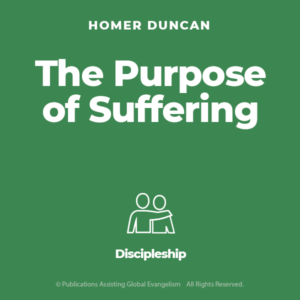
The Purpose of Suffering
$0.00 -
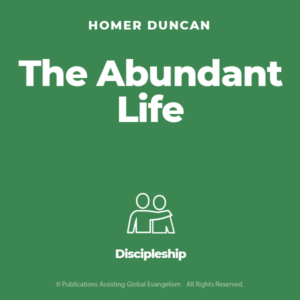
The Abundant Life
$0.00 -

Going on with God
$0.00 -

Christ is Your Life
$0.00 -

God’s Faithfulness in Trials and Testing
$0.00 -
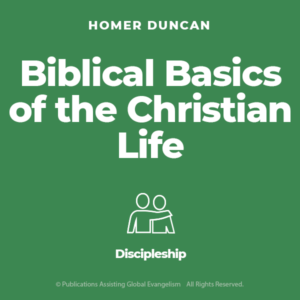
Biblical Basics of the Christian Life
$0.00 -

Victorious Life
$0.00 -

Fishers of Men
$0.00 -

Blessed Assurance
$0.00 -

All the Days of My Life
$0.00 -

I am Persuaded
$0.00

